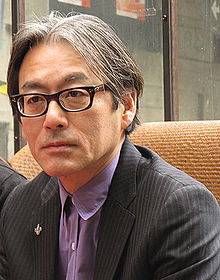Shigeru Umebayashi: Difference between revisions
m devoicing is variable in this position |
|||
| Line 20: | Line 20: | ||
| website = {{URL|http://www.shigeru-umebayashi.com}} |
| website = {{URL|http://www.shigeru-umebayashi.com}} |
||
}} |
}} |
||
{{nihongo|'''Shigeru Umebayashi'''|梅林茂|Umebayashi Shigeru|{{IPA-ja| |
{{nihongo|'''Shigeru Umebayashi'''|梅林茂|Umebayashi Shigeru|{{IPA-ja|ɯmebajaɕi ɕiɡeɾɯ|}}}} (born February 19, 1951 in [[Kitakyushu, Fukuoka]]) is a [[Japanese people|Japanese]] [[composer]]. |
||
Once the leader of Japan's [[New wave music|new wave]] rock band EX, composer Shigeru Umebayashi began scoring films in 1985 when the band broke up. He has more than 40 Japanese and Chinese films to his credit and is perhaps best known in the West{{fact|date=April 2015}} for "Yumeji's Theme" (originally from [[Seijun Suzuki]]'s ''[[Yumeji]]''), included in director [[Wong Kar-wai]]'s ''[[In the Mood for Love]]'' (2000). Umebayashi scored most of Wong Kar-wai's follow-up film, ''[[2046 (film)|2046]]'' (2004), and ''[[House of Flying Daggers]]''. He is also the composer for the music of the first [[Serbia|Serbian]] spectacle, ''[[Charleston & Vendetta]]''. Umebayashi received the special "Tomislav Pinter Award" at [http://www.filmforumzadar.org Avvantura Film Festival Zadar] (Croatia) in 2013 during his stay as member of the official Jury. |
Once the leader of Japan's [[New wave music|new wave]] rock band EX, composer Shigeru Umebayashi began scoring films in 1985 when the band broke up. He has more than 40 Japanese and Chinese films to his credit and is perhaps best known in the West{{fact|date=April 2015}} for "Yumeji's Theme" (originally from [[Seijun Suzuki]]'s ''[[Yumeji]]''), included in director [[Wong Kar-wai]]'s ''[[In the Mood for Love]]'' (2000). Umebayashi scored most of Wong Kar-wai's follow-up film, ''[[2046 (film)|2046]]'' (2004), and ''[[House of Flying Daggers]]''. He is also the composer for the music of the first [[Serbia|Serbian]] spectacle, ''[[Charleston & Vendetta]]''. Umebayashi received the special "Tomislav Pinter Award" at [http://www.filmforumzadar.org Avvantura Film Festival Zadar] (Croatia) in 2013 during his stay as member of the official Jury. |
||
Revision as of 21:39, 16 December 2017
Shigeru Umebayashi | |
|---|---|
 | |
| Background information | |
| Birth name | Shigeru Umebayashi |
| Born | February 19, 1951 Kitakyushu, Fukuoka, Japan |
| Genres | Rock, film scores |
| Occupation(s) | composer, musician |
| Years active | 1984–present |
| Website | www |
Shigeru Umebayashi (梅林茂, Umebayashi Shigeru, [ɯmebajaɕi ɕiɡeɾɯ]) (born February 19, 1951 in Kitakyushu, Fukuoka) is a Japanese composer.
Once the leader of Japan's new wave rock band EX, composer Shigeru Umebayashi began scoring films in 1985 when the band broke up. He has more than 40 Japanese and Chinese films to his credit and is perhaps best known in the West[citation needed] for "Yumeji's Theme" (originally from Seijun Suzuki's Yumeji), included in director Wong Kar-wai's In the Mood for Love (2000). Umebayashi scored most of Wong Kar-wai's follow-up film, 2046 (2004), and House of Flying Daggers. He is also the composer for the music of the first Serbian spectacle, Charleston & Vendetta. Umebayashi received the special "Tomislav Pinter Award" at Avvantura Film Festival Zadar (Croatia) in 2013 during his stay as member of the official Jury.
Filmography
1980s
- Itsuka Darekaga Korosareru (1984)
- Tomoyo Shizukani Nemure (1985)
- Sorekara (1985)
- Sorobanzuku (1986)
- Shinshi Domei (1986)
- Kyohu no Yacchan (1987)
- Getting Blue in Color (1988)
1990s
- Hong Kong Paradise (1990)
- Tekken (1990)
- Yumeji (1991)
- Ote (1991)
- Goaisatsu (1991)
- Arihureta Ai ni Kansuru Chosa (1992)
- Byoin he Iko 2 Yamai ha Kikara (1992)
- Nemuranai Machi Shinjuku Zame (1993)
- Izakaya Yurei (1994)
- Zero Woman (1995)
- Boxer Joe (1995)
- Kitanai Yatsu (1995)
- Hashirana Akan Yoake Made (1995)
- The Christ of Nanjing (1995)
- Shin Gokudo Kisha (1996)
- Izakaya Yurei 2 (1996)
- Ichigo Domei (1997)
- Isana no Umi (1997)
- Watashitachi ga Sukidatta Koto (1997)
- G4 Option Zero (1997)
- Fuyajo (1998)
- Belle Epoch (1998)
2000s
2010s
|
